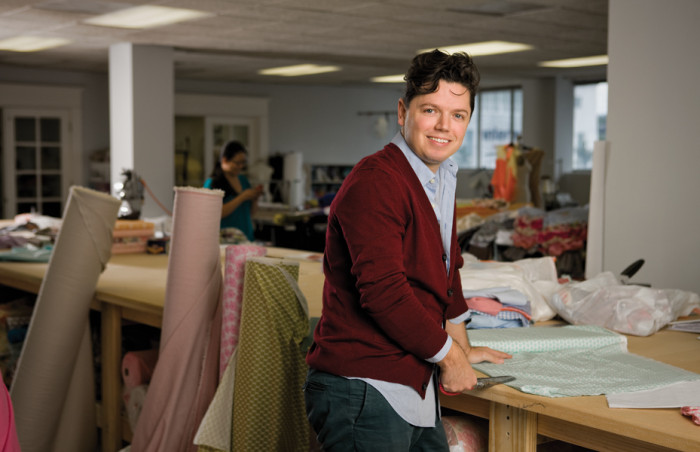David Peck’s new 6,000-square-foot fashion design studio and showroom on Kirby is bustling. Amidst the sewing, chatting, measuring, computing and whisking to-and-fro of fabric bolts and other accoutrements in the workroom area, painters are in the new showroom space applying finishing touches.
“We were in a friend’s garage before,” Peck said. The designer, 32, is sitting at a meeting table in the kitchen, occasionally answering a question from a staffer or offering a quick greeting to a visitor. “The other space was 5,500 square feet, but we only used half.”
It’s a study in contrasts to imagine the glamorous, sumptuous women’s wear created by Peck for David Peck Collection and Crop by David being crafted in a car garage. The designer himself, however, is also a study in contrasts.
 A classically trained cellist, Peck was born in Santa Fe. When he was eight, his family moved to the Denver area, then onward to Cleveland when he was a teen. He earned his first college degree in classical cello at Cleveland State University. Soon, however, an interest in fashion took precedence over his love of music and Peck pushed off to Paris. There he studied fashion design at Ecole Parsons à Paris. He also met his wife, Michelle Phillips, there and was exposed to a world outside his conservative upbringing, discovering for the first time many different viewpoints that would help shape his beliefs as an adult.
A classically trained cellist, Peck was born in Santa Fe. When he was eight, his family moved to the Denver area, then onward to Cleveland when he was a teen. He earned his first college degree in classical cello at Cleveland State University. Soon, however, an interest in fashion took precedence over his love of music and Peck pushed off to Paris. There he studied fashion design at Ecole Parsons à Paris. He also met his wife, Michelle Phillips, there and was exposed to a world outside his conservative upbringing, discovering for the first time many different viewpoints that would help shape his beliefs as an adult.
“I was accepting, but I still hadn’t formed my opinion,” Peck said. “It’s the first place I felt comfortable being a creative person and with my personality…France is really what changed me the most.“
He honed his skills in Paris working as a costume designer and for such legendary fashion houses as Paco Rabbane. In 2008, Peck returned to the U.S, to live in New York. He co-founded and was co-designer of Untitled 11:11, a brand of women’s clothing focusing on sustainable design practices, a philosophy to which he stays true in his current collections.
“We try to do everything as socially responsibly as we can. All of our cotton is organic and fair trade, local manufacturing. By keeping it local, that’s where we can make the most impact, save costs and create jobs.”
Peck credits his “conservative” parents with instilling in him a sense of responsibility and a concern for the environment. He said his family conserved, recycled and fostered a loving and accepting atmosphere.
“It wasn’t this hippie mother thing, it was just a quiet understanding,” he said. “They are open-minded and progressive, but they would never describe themselves that way.”
Two years ago, Peck and his wife relocated to Houston to be close to his mother-in-law, who had been diagnosed with cancer. While Houston isn’t the first place people think about when it comes to fashion design hubs, Peck has been more than pleasantly surprised with the city and its fashion prowess.
“Houston is a good fashion city,” he said. “People buy fashion. There is so much excitement here…Houston has always been supportive of the fine arts community. New York is fun, but creating a real business there is hard. It’s so expensive.”
Peck is excited about the upcoming Fashion Houston presented by Audi, for which he is preparing. The Nov. 12–15 event puts his work alongside other fashion heavy hitters, such as the aforementioned Dao and Max & Lubov Azria. He said he appreciates the “supportive and welcoming” vibe of the fashion and business community in Houston and works to create that sort of environment in his own business.
Promoting that sort of atmosphere, as well as providing quiet understanding and acceptance, especially to the gay and lesbian community members with whom Peck works side-by-side, was instilled at an early age by his parents. It remains at the core of his life and work.
So, while he doesn’t consider himself an activist when it comes to the causes important to him, such as equality, fair trade and labor practices and the environment, Peck does make them a priority in his day-to-day personal and business dealings.
“What I feel is most impactful is being good at what you do and being strong in your beliefs,” he said. “I try to practice what I preach. I feel a lot of people I’m surrounded by aren’t activists, but they live what they believe.”




































